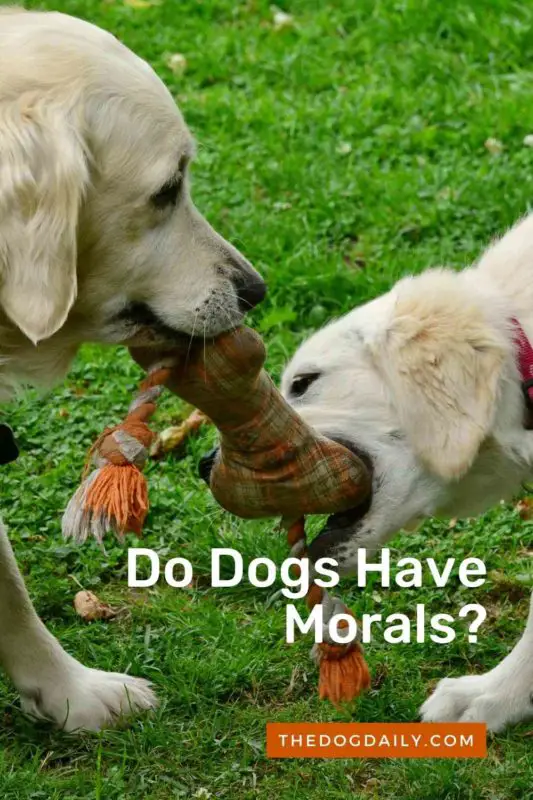Do Dogs Have Morals?
When a wolf bites, it can inflict up to 1,500 pounds of pressure per square inch. Yet, when two wolves square off in a playful wrestling match, each usually barely grazes its rival’s skin surface. Why?
In their book Wild Justice: The Moral Lives of Animals (University of Chicago Press, 2009), authors Marc Bekoff and Jessica Pierce argue that wolves, dogs, and other animals display a wide range of what we would consider being moral thoughts and actions. These include empathy, fairness, trust, and reciprocity.
Good Dog, Good Manners
The best and most evident example of morality among dogs and other canines, such as wolves and coyotes, comes from detailed studies on social play behavior, according to Beckoff, Professor Emeritus of Ecology and Evolutionary Biology at the University of Colorado, Boulder, and Pierce, a bioethicist at the same university. “Although play is fun, it’s also serious business,” they point out, adding that the four fundamental aspects of fair play in animals are:
- Ask first
- Be honest
- Follow the rules
- Admit when you’re wrong
Because actions like biting, mounting, and body-slamming can easily be misinterpreted, your dog will signal in advance with a bow that what’s to follow will be playful and non-threatening. According to the authors, if a dog violates this “rule of bowing,” fairness breaks down, and so does play. Beckoff adds that his work on coyotes living in Wyoming’s Grand Teton National Park shows that coyotes who don’t play reasonably often leave their pack because they don’t form strong social bonds. Such loners suffer higher mortality rates than those who remain with others. At the very least, he says, “cheaters have a harder time finding play partners.”
From Play to Morality
Beckoff and Pierce claim it’s just a step from play to morality, with studies on children showing similar fairness development. Like dogs, kids devise rules or follow pre-existing ones that allow for a certain degree of justice. Renowned primatologist Jane Goodall says, “As a child, I learned that behaving fairly during play with others was a significant social rule. As a mother, I learned that treating my child fairly was key in building his trust and cooperation.”
No one is perfect, but fair players usually apologize. Dogs do this, too, according to the researchers. For example, a bow might communicate something like, “Sorry I bit you so hard — I didn’t mean it, so let’s continue playing.”
Who’s the Fairest of Them All?
Both Beckoff and Pierce say it’s not fruitful to ask if members of one species are more moral than members of another because “animals do what they need to do to be card-carrying members of their species.” But morality appears to vary among individuals. For example, some people display more empathy than others. Some dogs are less aggressive. These differences are likely due to genetics, environmental influences, and daily life experiences.
“It may be that dogs have fewer vices. They don’t seem to experience schadenfreude [pleasure derived from the misfortune of others], nor do they seem to take pleasure in being cruel,” says Pierce. She adds that she and other dog-loving friends think dogs are better friends, more loyal, trustworthy, faithful, unconditional in their love, and more attuned to our needs and moods than other humans. So there may be a sense in which dogs are exemplars of particular human virtues.
Lessons to Learn from Dogs and Other Animals
Gorillas mourn their dead for lengthy periods. Elephants care for the sick and wounded
in their herds. Rats refuse to push food-rewarding levers when they know that doing so will cause another rat to receive an electrical shock. These are just a few examples of animal behaviors that might fall under morality issues if enacted by humans.
By studying such behaviors, “We learn about honesty, trust, cooperation, justice, fairness, and empathy,” said Pierce and Beckoff. “We can be reminded that we need each other, just like wolves in a pack need each
other. And we need to treat each other well if we want to live in a well-balanced, harmonious social group.”
Article written by Author: The Dog Daily Expert

